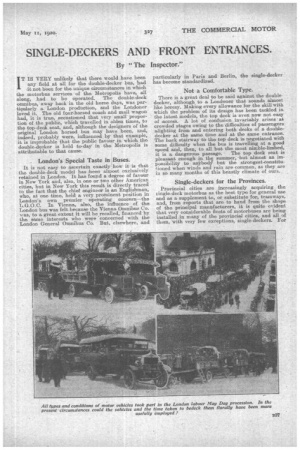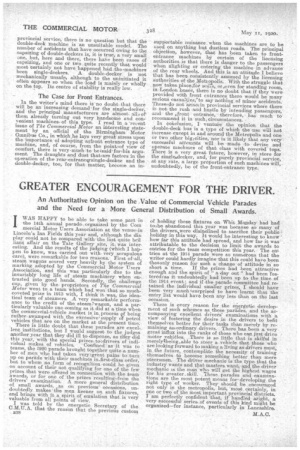SINGLE-DECKERS AND FRONT ENTRANCES.
Page 23

Page 24

If you've noticed an error in this article please click here to report it so we can fix it.
By "The Inspector."
IT IS -VERY unlikely that there would have been any field at all for the double-decker bus, had it not been for the unique circumstances in which the motorbus services of the Metropolis have, all along, had to be operated. The double-deck omnibus, away back in the old horse days, was particularly a Loudon production, and the Londoner loved it. The old four-horsed coach and mall wagon had, it is true, accustomed that very small proportion of the public, which travelled in olden times' to the top-deck seat, and, although the designers of the original London horsed bus may have been, and, indeed, probably were, influenced by that example, it is improbable that the public favour in which, the double-decker is held to-day in the Metropolis is attributable to that cause.
London's Special Taste in Buses.
It is not easy to ascertain exactly how it is that the double-deck model has been almost exclusively retained in London. It has found a degree of favour in New York and, also, in one or two other American cities, but in New York this result is directly traced to the fact that the chief engineer is an Englishman, who, at one time, held a very prominent position in London's own premier operating concern—the L.G.O.C. La 'Vienna, also, the influence of the London bus was felt because the Vienna Omnibus Co. was, to a great extent it will be recalled, financed by the same interests who were 'concerned with the London General Omnibus Co. But, elsewhere, and particularly in Paris and Berlin, the single-decker has become standardized.
Not a Comfortable Type.
There is a great deal to be said against the doubledecker, although to a Londoner that sounds almost like heresy. Making every allowance for the skill with which the problem of its design has been tackled in the latest models, the top deck is even now not easy of access. A lot of confusion invariably arises at crowded stages owing to the difficulties of passengers alighting from and entering both decks of a doubledecker at the same time and at the same entrance. The back stairway to the top deck is negotiated with some difficulty when the bus is travelling at a good speed and, then, to all but the most nimble-limbed, it is a dangerous passage. The top deck seat is pleasant enough in tht. summer, but almost an impassibility to anybodf but the strongest-constitutioned when winds and rain are common, as they are in so many months of this beastly climate of ours.
Single-deckers for the -Provinces.
Provincial cities .ELT£ increasingly acquiring the tingle-deck motorbus as the best type for general use and as a supplement to, or substitute for, tramways, and, from reports that are to hand from the shops of the principal mannfacturers, it is quite evident that very considerable -fleets of motorbuses are being installed in many of the provincial cities, and all of them, with very few exceptions, single-deckers. For provincial service, there is no question but that. the double-deck machine is an unsuitable model. The number of aedidents that have occurred owing to the capsizing of double-deckers is, it is true, a very small one, but, here and there, there have been eases of capsizing, and one or two ..quite recently that would most Certainly not have happened had .theenachines been single-deckers. A double-decker is not mechanically unsafe, although to the uninitiated it often appears so when the load is mainly or wholly on the top. Its. centre of stability is really low.
The Case for Front Entrances. •
In the writer's mind there is no doubt.that there will be an increasing demand for the single-decker, and the' principal manufacturers are almost all of them already turning out very haandsoine and convenient machines. of this type. I read in a 'recent issue of The Commercial Motor an interesting statement • by an official of the Birmingham Motor Omnibus. Co., in whieh.he lays very great stress upon the importa„nce of adopting asfront entrance type of machine, and, of course, from the pointsof view of comfort, there is very .much. to helsaidsfolohis argument. The draughts and dust that,are factors in the operation of the rear-entranceosingle-deckea and the double-decker, toe, for that matter, become an in supportable nuisance.. when the maehines are to be used on anything but dustless reads. The principal objection, however, that has been taken to frontentrance machines by certain of the licensing authorities is that there is danger to the passengers when alighting or entering the machine in advance of the rear wheels. And this is an attitude I believe that has been consistently assumed by the licensing authorities ofahe,Metioyolis. With the struggle that no takes.place,fer seais,.or,even for standing room, in,London louses, there is no doubt that if they were provided with front entrances there would be many serious easualties,°to say nothing of minor accidents.Theseido not ariseKin provincial services where there is .not. the rush arid hustle by intending passengers,and, the jrant entrance,therefore, has much -be recommend it in such circumstances.
cobelusion, venture the opinion that the double-deck bus is a type of which the use will not increase except in and around the Metropolis and one or two other bigecities, nor is it likely that any very euceessful at/ern-sits will -be .made -to devise and operate machines • of that class with covered tops: There is a very great future, however, in store for the singleadecker, and, 'for purely provincial service, at any rate, a large proportion of such maehines*ill, undoubtedly, be of the front-entrance type.




























